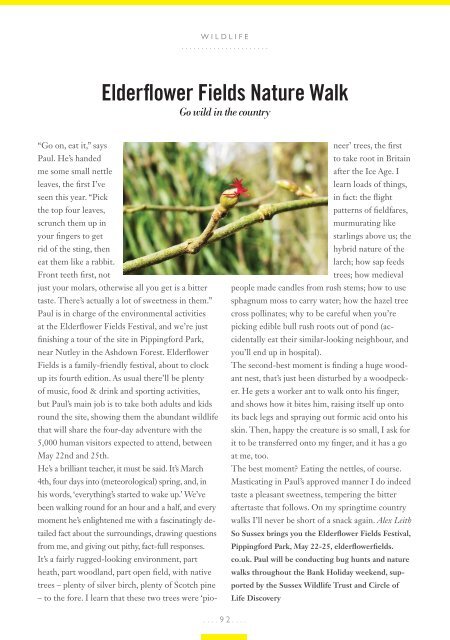Viva Brighton April 2015 Issue #26
Create successful ePaper yourself
Turn your PDF publications into a flip-book with our unique Google optimized e-Paper software.
WILDLIFE<br />
......................<br />
Elderflower Fields Nature Walk<br />
Go wild in the country<br />
“Go on, eat it,” says<br />
Paul. He’s handed<br />
me some small nettle<br />
leaves, the first I’ve<br />
seen this year. “Pick<br />
the top four leaves,<br />
scrunch them up in<br />
your fingers to get<br />
rid of the sting, then<br />
eat them like a rabbit.<br />
Front teeth first, not<br />
just your molars, otherwise all you get is a bitter<br />
taste. There’s actually a lot of sweetness in them.”<br />
Paul is in charge of the environmental activities<br />
at the Elderflower Fields Festival, and we’re just<br />
finishing a tour of the site in Pippingford Park,<br />
near Nutley in the Ashdown Forest. Elderflower<br />
Fields is a family-friendly festival, about to clock<br />
up its fourth edition. As usual there’ll be plenty<br />
of music, food & drink and sporting activities,<br />
but Paul’s main job is to take both adults and kids<br />
round the site, showing them the abundant wildlife<br />
that will share the four-day adventure with the<br />
5,000 human visitors expected to attend, between<br />
May 22nd and 25th.<br />
He’s a brilliant teacher, it must be said. It’s March<br />
4th, four days into (meteorological) spring, and, in<br />
his words, ‘everything’s started to wake up.’ We’ve<br />
been walking round for an hour and a half, and every<br />
moment he’s enlightened me with a fascinatingly detailed<br />
fact about the surroundings, drawing questions<br />
from me, and giving out pithy, fact-full responses.<br />
It’s a fairly rugged-looking environment, part<br />
heath, part woodland, part open field, with native<br />
trees – plenty of silver birch, plenty of Scotch pine<br />
– to the fore. I learn that these two trees were ‘pioneer’<br />
trees, the first<br />
to take root in Britain<br />
after the Ice Age. I<br />
learn loads of things,<br />
in fact: the flight<br />
patterns of fieldfares,<br />
murmurating like<br />
starlings above us; the<br />
hybrid nature of the<br />
larch; how sap feeds<br />
trees; how medieval<br />
people made candles from rush stems; how to use<br />
sphagnum moss to carry water; how the hazel tree<br />
cross pollinates; why to be careful when you’re<br />
picking edible bull rush roots out of pond (accidentally<br />
eat their similar-looking neighbour, and<br />
you’ll end up in hospital).<br />
The second-best moment is finding a huge woodant<br />
nest, that’s just been disturbed by a woodpecker.<br />
He gets a worker ant to walk onto his finger,<br />
and shows how it bites him, raising itself up onto<br />
its back legs and spraying out formic acid onto his<br />
skin. Then, happy the creature is so small, I ask for<br />
it to be transferred onto my finger, and it has a go<br />
at me, too.<br />
The best moment? Eating the nettles, of course.<br />
Masticating in Paul’s approved manner I do indeed<br />
taste a pleasant sweetness, tempering the bitter<br />
aftertaste that follows. On my springtime country<br />
walks I’ll never be short of a snack again. Alex Leith<br />
So Sussex brings you the Elderflower Fields Festival,<br />
Pippingford Park, May 22-25, elderflowerfields.<br />
co.uk. Paul will be conducting bug hunts and nature<br />
walks throughout the Bank Holiday weekend, supported<br />
by the Sussex Wildlife Trust and Circle of<br />
Life Discovery<br />
....92....


















